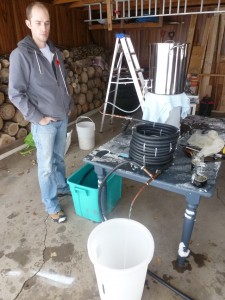Having completed our mash, we are ready to boil. What I call “the boil” actually includes a number of steps:
- bringing the wort to a boil,
- adding hops,
- removing coagulated proteins and other impurities, and
- rapidly chilling the wort to fermentation temperatures.
There are several reasons the wort must be boiled:
- The bitterness, flavour, and aroma of the hops are best extracted at a rolling boil.
- Boiling deactivates malt enzymes, setting the gravity of the wort.
- Boiling sterilizes the wort.
- Boiling coagulates proteins and protein-tannin combinations, helping clarify the wort.
- Boiling drives off water, concentrating sugars and allowing the brewer some control over the gravity of the wort.
- Boiling over an open flame can lightly caramelize the wort, adding
…
Continue reading.
As mentioned in the Intro, the primary job of a brewer is to create a fermentable liquid called wort. This involves converting some of the complex starches found in grain to simple sugars, then extracting those sugars into a solution so that yeast can metabolize them and create alcohol, carbon dioxide, and a number of other aromatic and flavourful compounds.
This post is about making wort. It includes info on water, barley, malt, grinding, mashing, lautering, and sparging.
Water. Water is important. Beer is, after all, mostly water. So are we. Historically the water source at a brewery informed the style of beer that they made. Places with alkaline water found that using acidic, heavily roasted malts … Continue reading.
 I consider apple cider to be a generous gift from nature: with a small amount of work you can secure enough alcohol to last a year. There are thousands of well-established apple trees in Edmonton. At this point in time most of the owners can’t or don’t want to use all the fruit, and by volunteering with OFRE or just knocking on doors you have easy access. Once you have secured apples, if you crush and press them, they will, of their own accord, turn into cider. No need to add sugar, or acid, or yeast, or anything. It’s amazing.
I consider apple cider to be a generous gift from nature: with a small amount of work you can secure enough alcohol to last a year. There are thousands of well-established apple trees in Edmonton. At this point in time most of the owners can’t or don’t want to use all the fruit, and by volunteering with OFRE or just knocking on doors you have easy access. Once you have secured apples, if you crush and press them, they will, of their own accord, turn into cider. No need to add sugar, or acid, or yeast, or anything. It’s amazing.
Beer is quite the opposite. Brewing is so complicated, and relies so heavily on human intervention, it’s difficult to imagine … Continue reading.
The personal website of Edmonton chef Allan Suddaby
